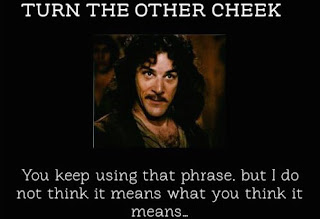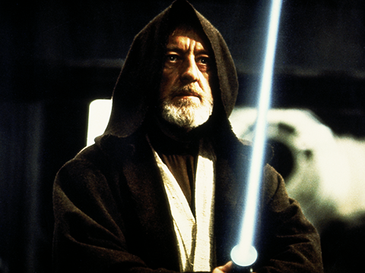What do we do about people who hurt us? There are a lot of
factors at play when we attempt to answer such a question, and truly how we answer
it depends on our particular circumstances. Our lectionary this past Sunday
attempted to provide responses to two such scenarios—how to process and move
forward after a hurt has already taken place, and how to respond to a hurt as
it is currently happening to us.
'Joseph said to his brothers, "I am Joseph.
Is my father still alive?" But his brothers could not answer him, so
dismayed were they at his presence.
Then
Joseph said to his brothers, "Come closer to me." And they came
closer. He said, "I am your brother, Joseph, whom you sold into Egypt. And
now do not be distressed, or angry with yourselves, because you sold me here;
for God sent me before you to preserve life. For the famine has been in the
land these two years; and there are five more years in which there will be
neither plowing nor harvest. God sent me before you to preserve for you a
remnant on earth, and to keep alive for you many survivors. So it was not you
who sent me here, but God; he has made me a father to Pharaoh, and lord of all
his house and ruler over all the land of Egypt. Hurry and go up to my father
and say to him, 'Thus says your son Joseph, God has made me lord of all Egypt;
come down to me, do not delay. You shall settle in the land of Goshen, and you
shall be near me, you and your children and your children's children, as well
as your flocks, your herds, and all that you have. I will provide for you
there--since there are five more years of famine to come--so that you and your
household, and all that you have, will not come to poverty.'"
And
he kissed all his brothers and wept upon them; and after that his brothers
talked with him.'
--Genesis
43: 3-11, 15
Let’s start with the first scenario, which we find in the story
from Genesis about Joseph. You remember Joseph, Jacob’s son with that
amazing technicolor dreamcoat?


Actually, the Bible only says it was a coat with long sleeves, not
one of many colors, but that’s a topic for another blog post!
Joseph’s 11 brothers were
homicidally jealous of Joseph’s ability to interpret dreams and his high favor
with his father, so they sold him into slavery. If anyone had a
right to bear a grudge, it was Joseph. Years later, as Joseph finds himself in
the court of Pharaoh, he is reunited with his brothers when a famine strikes
the land. We almost expect him to enslave or imprison them as the consequence
of reaping what they sow. How many of us would blame him? Yet when given the
choice to act out of vengeance, Joseph instead chooses to feed his brothers and
ensures their survival (and that of the 12 Tribes of Israel). He kisses them
and weeps over them, and it seems the hurt has been forgiven. But
how?
In Joseph’s case, he had years to process the
incredible pain of being forced into slavery. Day after day he must
have wrestled with it. Over time, though, Joseph comes to see that
the grace of God has worked even with this horrific set of circumstances, and
now, in a reversal of fortune, as Joseph has authority over his brothers, he is
able to act from a place of compassion for them. It is only in retrospect,
however, and by way of claiming his own power, that Joseph is able to affirm
that even the event that ripped him from his homeland and family and sent him
into the hell of slavery has now been turned by God to a providential purpose. It
took time, and it took Joseph coming to see that even in misery God was still
moving, still acting, still giving him strength. Standing before his
oppressors, looking back on God’s activity in his life, Joseph is given a
choice, and he chooses mercy, able to let go of whatever temptation he once had
for vengeance on his brothers because now it is he who has power over them.
A family that was once broken apart by jealousy and sin is reconciled, but only
because Joseph managed to see God’s action and claim the power that God was
working through him.
For those of us who have been hurt deeply, the Joseph story
provides hope that God can transform a curse into a blessing, but it does not
happen immediately. It happens with time and the gift of retrospect,
and it happens when we claim the power that God is working through us. Those
who hurt us do so because they have power over us—as Joseph’s brother did—but
God’s grace can work in us—as it worked in Joseph—to bring us to a place where
we can claim our power, and once we seize that power we can make the choice, as
Joseph did, to act with compassion, rather than vengeance. But what,
then, for those of us who are still caught in the cycle of hurt, who have not
had the gift of retrospect and chance to process, who cannot claim our power?
What then can we do?
'Jesus said, "I say to you that listen,
Love your enemies, do good to those who hate you, bless those who curse you,
pray for those who abuse you. If anyone strikes you on the cheek, offer the
other also; and from anyone who takes away your coat do not withhold even your
shirt. Give to everyone who begs from you; and if anyone takes away your goods,
do not ask for them again. Do to others as you would have them do to you."'
--Luke 6: 27-31
This is where Jesus’ teachings in the Gospel come in. He
begins with the oxymoronic statement to 'Love your enemies,' then gives
examples of what that love looks like in action: do good to those
who hurt you, bless those who curse you, and pray for those who abuse
you. If we take this passage and try to put it side-by-side with the one
from Genesis, we might be quick to say that the way we address being hurt is to
not seek vengeance, as Joseph does not seek vengeance, and to simply love and
forgive and do good, as Jesus instructs. This, quite frankly is the
low-hanging fruit that we could easily grab, but it’s fruit that’s rather
rotten. The fact is that Joseph and Jesus are in two very different
contexts. Remember, context is everything! Jesus is talking to
people who are in the middle of being oppressed themselves by their Roman
occupiers, while the story of Joseph happens years after the initial
offense. The ability to forgive, to choose not to seek vengeance and to
have compassion, is only possible if you are in a position of power, as Joseph
ultimately finds himself in. The folks Jesus is speaking to, however,
have no power at all. Simply forgiving will only repeat the constant
cycle of oppression and abuse that they are experiencing. So what are
they to do? His advice to do good, bless, pray, turn the other cheek, and
giving their shirt are actually methods by which the power dynamics of their
time are flipped upside-down. To do those things robs their oppressors of
the power they have and restores dignity to those being oppressed. For
more detail on what those actually mean, you can check out my blog post here from two years ago.

Yet if we are perfectly honest, this text has some problematic
pieces for those of us who may be in the midst of a hurtful relationship right
now. If we are in an abusive relationship, doing good and blessing our
abuser will not stop the cycle of oppression. Turning the other cheek doesn’t
have the same transformational power in our culture as it did in Jesus’.
This is also where it does not help us to try to apply the example of Joseph to
the example of one who is still in the midst of being hurt. Too many
people—especially women—have remained in abusive relationships because they are
told—especially by clergy—to be like Joseph and to not seek vengeance, and to
just forgive. They are told, in the words of Jesus, to love the one who
beats them, to bless that person, and to keep treating them way they would want
to be treated. But what if the other party isn’t interested in that
arrangement and only continues the cycle of abuse? In that case, Jesus’
words may be of little comfort, but there is one line that can help those
caught in that cycle to claim some power for themselves: pray for those
who abuse you. Honestly, this is a hard one, and again, it has been
misused by clergy to condone remaining in abusive relationships, but when we
pray for someone we do, indeed, take some of their power over us away. We
commend them to God, and therein lies some a measure of hope for our
future. Therein lies power for the powerless. Prayer is the only
weapon we Christians have, and do commend an abuser to God in prayer is a
powerful action. We must remember, however, that praying for one’s abuser
does not equal staying with that abuser, and sometimes the most loving action
one can take is to walk away and end the relationship—as Jesus instructs his
disciples to do when they themselves enter a town and are abused: shake
the dust off your feet, he tells them.
Brothers and sisters, how we
deal with hurt is hard and complicated. So much of hurt has to do with
power, who has it, and how it is wielded. Sometimes there is no simple
solution, and while I wish our Scriptures gave us universal truths that can
always be applied to all places and circumstances, the reality is that that is
not always the case, thus the similar, yet distinctly different, messages of
our texts today. Indeed, it takes some real digging, some hard analysis
of the context to find good news sometimes, but it’s there. It’s always there.
The lesson from Joseph’s forgiveness of his brothers gives those of us who have
processed our hurt the hope that we can claim our own power and act with
compassion instead of vengeance when the opportunity is given to us. For
those of us still caught in the cycle of abuse and oppression, Jesus’ words to
love, bless, and do good may ring somewhat hollow, but his urging the abused to
pray, to commend the abuser over to God, and when necessary to leave and shake
the dust off of their feet is a mighty reclaiming of power and the truth that
they are beloved of God. At the core of all Scriptures, even the hard
ones, is that truth, that we are beloved of God, and that our power lies in
that truth. When we seize that power all things can and will be healed.
And that is always Good News!

